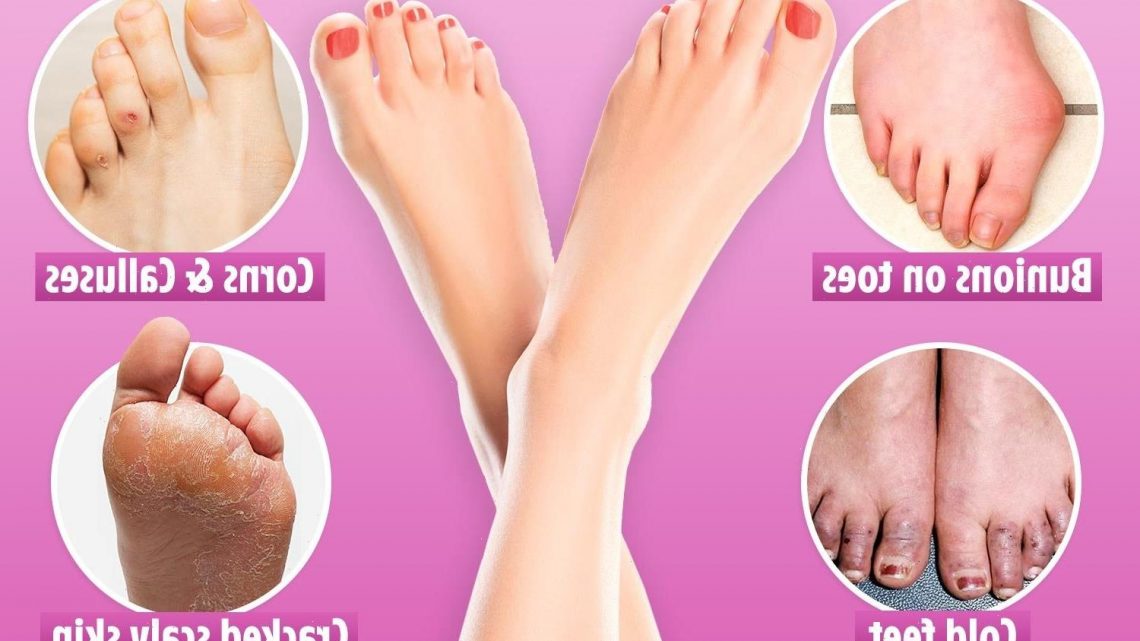
Looking for early signs of problems like diabetes or heart disease? Check your feet
04/18/2021COVID is in retreat as cases continue to fall, vaccinations rise and lockdown eases.
But in its wake, the deadly pandemic leaves behind a painful legacy.
While many have been lucky enough to escape the virus itself, for millions lockdown has taken its toll mentally, physically and emotionally.
From back pain and putting on a few pounds to anxiety and depression, the health impact of the past year is wide-ranging.
And now experts are warning of a new phenomenon, “lockdown feet” — caused by months of slouching around in slippers and flip-flops, or going barefoot.
“The ligaments in the foot can stretch out, arches are unsupported and putting on anything with a heel becomes painful,” explains Emma McConnachie, podiatrist and spokesman for The College of Podiatry.
“If your feet go unsupported, they can start to feel the strain. Wearing floppy slippers all the time eventually takes its toll.
“Many patients are struggling with foot issues and are trying to fix the problems themselves.
“They assume we are closed, but podiatrists are very much open and there to help.”
And it turns out “lockdown foot” isn’t the only health problem linked to your feet.
Emma tells Fab Daily that taking a bit more notice of your soles could help you spot early signs of other problems like arthritis and ageing, as well as diabetes and heart disease.
So, as summer approaches and beauty salons open up for pedicures, Lynsey Hope reveals the signs to watch out for as you prime your feet for sunny sandal season.
BUNIONS ON TOES
Potential diagnosis: Ill-fitting shoes, genetics, arthritis
Bunions are hard, bony lumps on the side of your foot by your big toes.
They can cause the big toe to turn inwards towards your other toes, and they are caused by a build-up of pressure.
It’s often just down to genetics, but it may also be a sign of arthritis or ill-fitting shoes.
What next? Wide-fit shoes with a low heel and cushioned soles can stop them getting worse.
A podiatrist might offer you shoe inserts to stop the pressure on that joint.
PAIN IN ARCH OR HEEL
Potential diagnosis: Lockdown foot
Lockdown has caused a surge in the number of people experiencing pain in the sole of the foot – and walking around barefoot or spending long spells in slippers is to blame.
Many of us have gone from wearing work shoes for ten hours a day to something completely different.
There has been an increase in plantar fasciitis, which is pain around the heel and arch.
It’s most common in those aged 40 to 60, but we’re now seeing it in many other people.
The plantar fascia is a bowstring-shaped ligament that absorbs shock when you walk. If tension on the bowstring becomes too great, small tears can occur.
What next? If you are working from home, think about footwear. If you like wearing slippers, buy a quality pair with arch support.
Ditch any bought from a value chain. And most importantly, if you are in pain, see a podiatrist. They are still open.
CRACKED SKIN
Potential diagnosis: Ageing
Cracked skin is usually due to a lack of moisture. It tends to happen more as we get older but if you have been going barefoot more than usual this can dry the skin even more.
Many people spend lots of money on good-quality creams for their face and body, but too often stop when they get to the ankles, leading to dryness.
What next? You should apply cream regularly to your feet – a little bit every day or a few times a week. But never apply it in between your toes, as it can increase the risk of fungal infections.
You can buy special creams such as Flexitol Heel Balm (£3.82, boots.com) if your feet are especially dry or have already started to crack.
These are sold in supermarkets and chemists.
SWOLLEN FEET
Potential diagnosis: Blood clots, diabetes, heart, liver or lung disease
Your feet may swell in hotter weather or if you have been standing or sitting for long periods. But in rare cases it could be a sign of something more serious going on.
What next? There are exercises you can do to reduce swelling and boost the blood flow to the feet.
Try pointing your foot out in front of you and using your big toe to draw a circle. Do this ten times clockwise and ten times anti-clockwise.
But if you notice any unusual swelling it is vital to get it checked out fast, especially if you have any underlying health conditions such as Type 2 diabetes or heart disease. And get immediate advice if it only affects one leg, is severe or feels hot to touch – it could be a sign of a blood clot.
CORNS & CALLUSES
Potential diagnosis: Ill-fitting shoes, diabetes, obesity
A callus is a thick, yellowish lump of dead skin which develops when the skin is exposed to excessive pressure or friction.
Corns are small lumps of hard skin. They usually occur as a safety precaution to protect your skin.
Most podiatrists have seen fewer during lockdown as fewer people are squeezing their feet into ill-fitting dress shoes, which is often the cause.
Sometimes they may be caused by obesity or Type 2 diabetes.
What next? To help prevent them, make sure your shoes fit well. Using a pumice or foot file over hardened areas can also keep them down.
CRACKED SCALY SKIN
Potential diagnosis: Fungal infections, diabetes
It’s quite common to pick up fungal infections at swimming pools, gyms or leisure centre changing rooms, so we have seen fewer cases in lockdown.
But lots of people have used the time to treat long-standing infections.
It might be that you had athlete’s foot before lockdown and walking around in warm slippers has made it worse. It may also have spread to a nail.
What next? Recurrent infections can be a sign of diabetes.
But skin infections are easily treated with over-the-counter antifungal treatments.
Nail infections can be trickier, so it is worth consulting a podiatrist to see which is the best option.
RASHES
Potential diagnosis: Covid-19
Medics are now reporting a condition called “Covid toe” among people who have been affected with coronavirus.
It looks a little like chilblains and is a red, purplish rash that can occur on the toes and/or fingers.
It is often seen after the initial infection – so a few days after more typical symptoms such as a cough or high temperature.
It happens because the virus attacks our vascular system and damages the skin.
What next? If you notice this on your feet it is advisable to get it checked out – and take a Covid test.
Many podiatrists currently offer virtual consultations or allow you to send in photos if you are having to self-isolate.
COLD FEET
Potential diagnosis: Raynaud’s syndrome, poor circulation, anxiety
If you have cold feet regularly, it could be a sign of poor circulation.
Lots of us are at home more, and if you are often barefoot it’s possible your feet are just too cold.
But some people have a condition called Reynaud’s syndrome, a disorder that affects your blood circulation.
For some people it can make their toes turn blue or purple.
It’s worse in winter and in people who are not as active. If you are worried, speak to your doctor or a podiatrist.
Stars' tootsie troubles
From Kim Kardashian and Sandra Bullock to J-Lo and Britney, these superstars are proof no woman is immune from shoe dramas.
Their ill-fitting footwear and crushed toes not only look painful but could go on to cause bunions, corns and calluses. It really does pay to get a good fit, when it comes to your feet.
Your first aid kit
- Neo G NeoThotics heel cushions, £21.99 from boots.com – buy now
- Scholl dry skin foot mask, £3.99 from superdrug.com – buy now
- Body Shop Peppermint foot rescue, £7.50 from thebodyshop.com – buy now
- O’Keeffe’s Healthy Feet foot cream, £6.37 from boots.com – buy now
- Curanail 5% fungal nail treatment, £18.70 from Amazon – buy now
- Eco Bath natural black pumice Stone, £4.99 from hollandandbarrett.com – buy now
‘I’m only 39 but hobble about like old woman’
ENTERTAINER Anna Reay, 39, from Newcastle, below, is a single mum Buddy, six.
She says: “I’m a singer, so before the pandemic, I’d spend hours performing each night in sparkly high heels but I never really suffered any pain.
“Now I spend my days in slippers and trainers.
“I thought it would be good for my feet to have a break, but during lockdown I started getting severe pain in my heels.
“And while it’s mainly in the heels, I sometimes feel it up my calf too.
“I’ve been walking more than I would have done and I’ve put on a bit of weight this last year, so that doesn’t help the problem either.
“I’m under 40 but sometimes I’m hobbling around like I’m much older, even though I’m very young at heart.
“It’s very uncomfortable and strange that it should happen when I stopped wearing the heels, which I had always worried were so bad for my feet.”
Source: Read Full Article






















